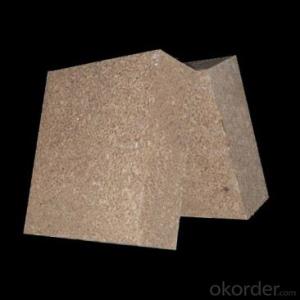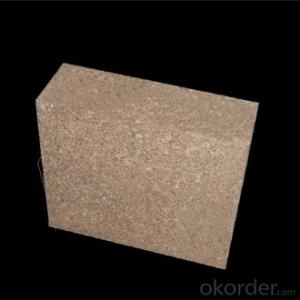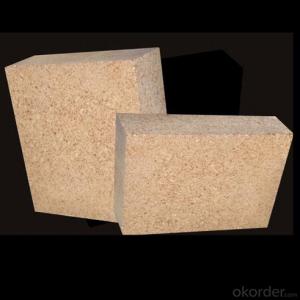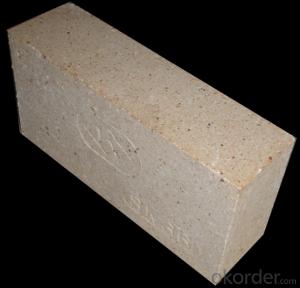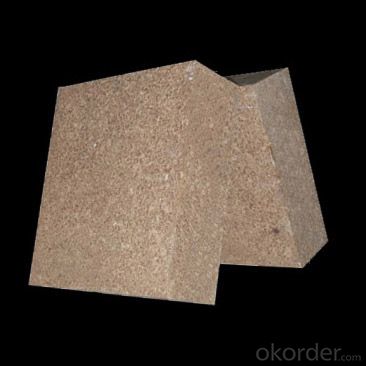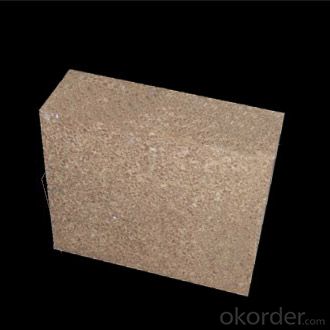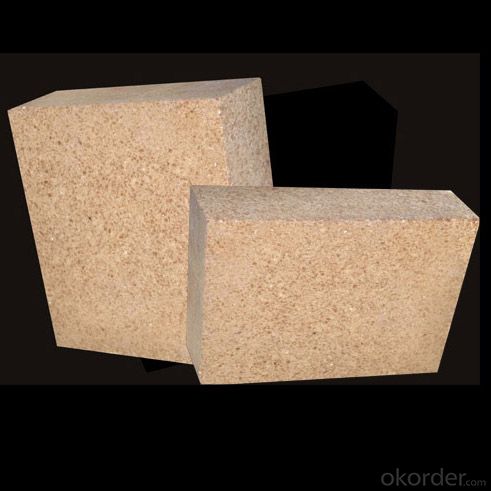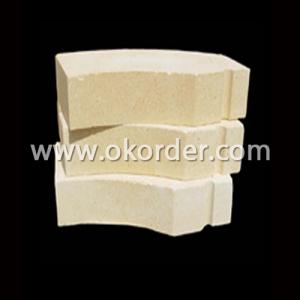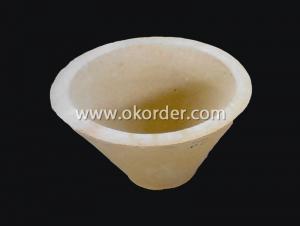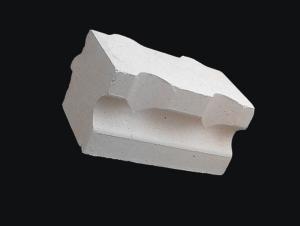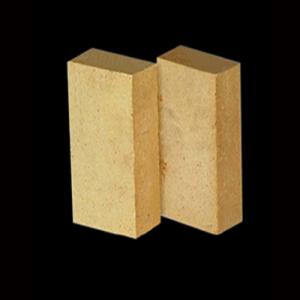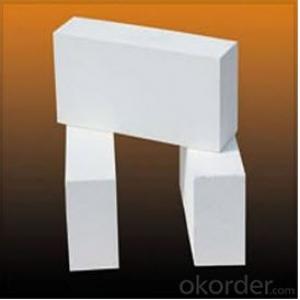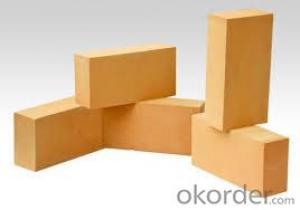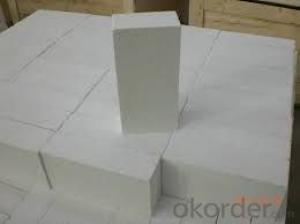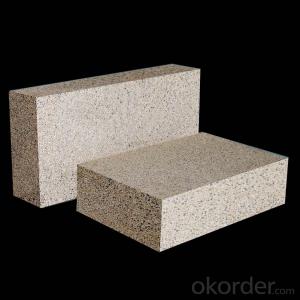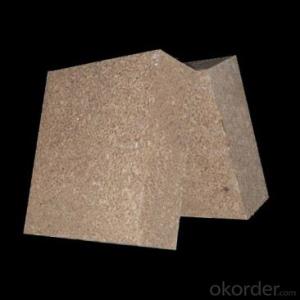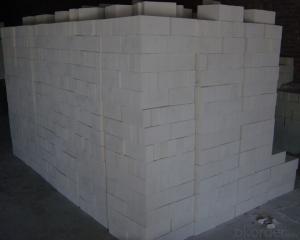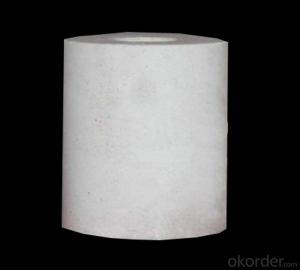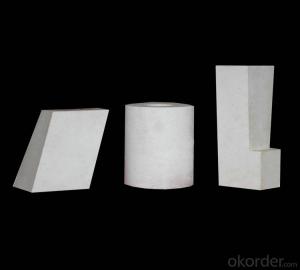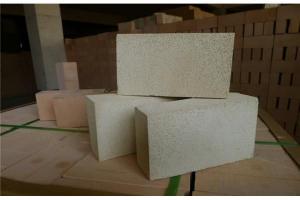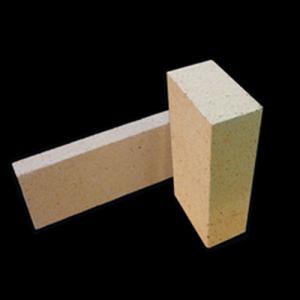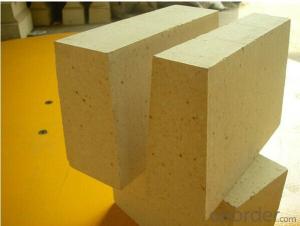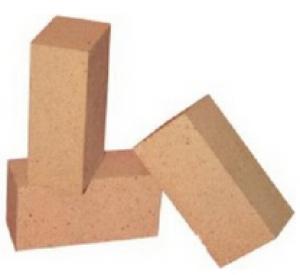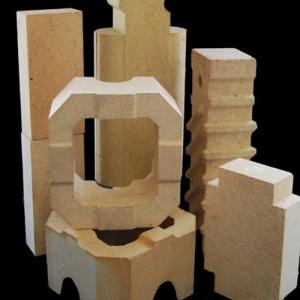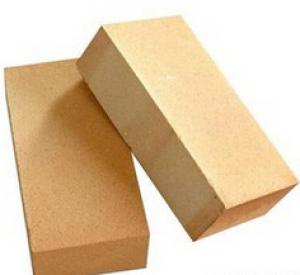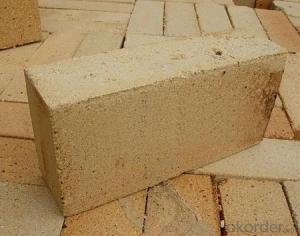High Alumina Bricks for Torpedo Ladle
- Loading Port:
- Qingdao
- Payment Terms:
- TT OR LC
- Min Order Qty:
- 10 kg
- Supply Capability:
- 10000 kg/month
OKorder Service Pledge
OKorder Financial Service
You Might Also Like
High Alumina Bricks Applied in Torpedo Ladle
Composite of High Alumina Bricks
High Alumina Bricks are classified according to alumina content ranging from 48% to 90%.
Main Features of High Alumina Bricks Applied in Torpedo Ladle
Low thermal conductivity
Excellent acid and base slagging resistance
High refractoriness
Excellent thermal shock resistance
Excellent mechanical strength
Application of High Alumina Bricks Applied in Torpedo Ladle
commonly used in blast furnace, hot blast furnace, the roof of electric furnace, teeming ladle, rotary kiln, regenerator, etc
High Alumina Bricks Images
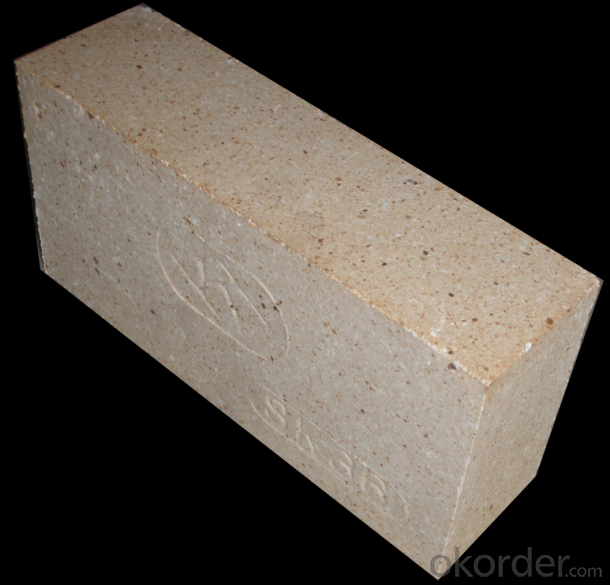
Specification of High Alumina Bricks Applied in Torpedo Ladle
HIGH ALUMINA BRICK---ALP85 | |
Apparent Porosity (%) | ≤18 |
Bulk Density (g/cm3) | ≥2.85 |
Cold Crushing Strength (Mpa) | ≥80 |
Modulus Of Rupture (Mpa) | ≥20 |
Refractoriness Under Load (0.2 Mpa)(℃) | 1450 |
Permanent Linear Change (%) | 1500℃×3h -0.5 ~+0.5 |
Chemical Composition (%) |
|
Al2O3 | ≥82 |
Fe2O3 | ≤1.5 |
P2O5 | ≤3 |
FAQ of High Alumina Bricks Applied in Torpedo Ladle
Q1:Are you a manufacture or trader?
A:Factory+trade(mainly factories, at the same time, we operates other related products).
Q2:Can we visit your factory?
A:Sure,welcome at any time, seeing is believing.
Q3:What's the MOQ of trial order?
A:No limit, We can offer the best suggestions and solutions according to your condition.
Q4:Which payment terms can you accept?
A:T/T,L/C are available for us.
Q5:After an order is confirmed, when to deliver?
A:15-25days after deposit.
Q6:Is your company accept customization?
A:We have own factory and excellent technical team, and we accept OEM service.
Q7:How about your company's certification?
A:ISO9001 and Test Report, also we could apply other necessary certification.
Q8:How to solve the quality problems?
A:If the products are not confirmed to customer samples or have quality problems, our company will be responsible to make compensation for it.
Q9:Can you offers samples?
A:Of course, samples are free but freight paid by the buyers.
Q10:What is the service life of your bricks?
A:The service life of different bricks is unlike. It also depends on your using condition and method.
- Q: What's the difference between high alumina refractory bricks and high alumina refractory bricks?
- The chemical pH value of high alumina refractory brick belongs to neutral and alkaline refractory brick, and clay refractory brick belongs to neutral and acid refractory brick.
- Q: What are the reasons for the decline in the performance of high alumina bricks when we use high alumina refractory bricks?
- Quality requirements for aluminium bricks of different grade. 2, high aluminum powder and high alumina aggregate and other materials of reasonable proportion, to reach the production requirements.
- Q: Density of high alumina bricks
- High alumina brick by aluminum content is divided into four grades, three grade high alumina bricks content of not less than fifty-five percent, two grade high alumina bricks content of not less than 65, a high aluminum brick content of not less than 75, super high aluminium brick content above 85. As for the high aluminum brick shape, in addition to the standard high alumina brick, high alumina brick and general type, also called special high alumina brick, if the shape is very irregular it is usually called the specific type of high alumina brick, in short, to customized according to the specific use of kiln.
- Q: What is the difference between T3 refractory bricks and high alumina refractory bricks?
- The T3 in T3 refractory bricks refers to the model indicating that the refractory brick model is T-3, and that the corresponding T-3 model is 230*114*65 (mm)
- Q: What is the density of a super high alumina brick and what is the price?
- Of course, the transaction price, please choose refractory brick manufacturer is better.
- Q: Which is better, the soft core or the hard core?
- When the current through the wire, it will produce a magnetic field in the vertical plane space of the wire, if there is a current two wire close by in the same direction, because they produce a magnetic field in the direction is opposite, it will produce a repulsive force is due to the magnetic field force. They will mutually inhibit current intensity of the other party, caused by the reduction of current in the wire, this inhibition of each current intensity, we called wire inductance. When the AC current line frequency is high, the inductance is stronger.
- Q: The difference between ordinary and diatomite brick refractory brick
- Insulation products made from diatomaceous brick and porous diatomite. The main raw material is natural porous diatomite, and then a small amount of clay and fuel are added. The volume density of diatomite brick was 0.7g/cm3, compressive strength at room temperature is 1 ~ 2MPa, the coefficient of thermal conductivity at 400 C for 0.13 ~ 0.20W/ (M - K), the apparent porosity is greater than 70%, the coefficient of thermal expansion (1280 degrees) 0.9 x 10 - 6 DEG -1, refractoriness is greater than 1250 DEG C. Mainly used in industrial kilns and other thermal equipment, thermal pipes insulation materials, generally withstand the hot surface temperature of about 1000 degrees celsius. Mainly used in industrial kilns and other thermal equipment, thermal pipes insulation materials, generally withstand the hot surface temperature of about 1000 degrees celsius.
- Q: The difference between light high alumina brick and heavy aluminum brick
- Lightweight high alumina brick, also called high alumina insulation brick. Alumina content of 48% or more, mainly from mullite and glass phase or corundum composition of lightweight refractory. Volume density 0.4 - 1.35g/cm3. Porosity 66% - 73%, compressive strength 1 - 8MPa. Better thermal shock resistance. Usually, a high alumina clinker is added with a small amount of clay. After grinding, it is poured and shaped in the form of slurry by gas generation or foam method, and it is fired at 1300 - 1500 DEG C. Sometimes industrial alumina can be used instead of some bauxite clinker. Used for lining and insulation of masonry kilns, as well as for areas where there is no strong, high temperature molten material erosion and erosion. When contacting the flame directly, the surface contact temperature shall not be higher than 1350 degrees centigrade.
- Q: Which thermal shock stability of clay brick and high alumina brick is good?
- The product has the advantages of high temperature, little creep, strong corrosion resistance and good thermal shock resistance, and is suitable for large and medium-sized hot blast stoves.Thermal shock stability is much better than clay brick.
- Q: What is the high temperature limit of refractory bricks and refractory soil?
- Fire clay -- usually refers to folk point stove furnace set with a kind of soil, limit under atmospheric pressure of 1500 degrees fire clay soil 1, properties and uses: clay brick of weak acid refractory material, its thermal stability is good, suitable for hot blast furnace, boiler and flue, smoke chamber lining, etc..2, product specifications form: standard shape, general, special-shaped and special-shaped brick. Physical and chemical properties of fireclay bricks.
Send your message to us
High Alumina Bricks for Torpedo Ladle
- Loading Port:
- Qingdao
- Payment Terms:
- TT OR LC
- Min Order Qty:
- 10 kg
- Supply Capability:
- 10000 kg/month
OKorder Service Pledge
OKorder Financial Service
Similar products
Hot products
Hot Searches
Related keywords
